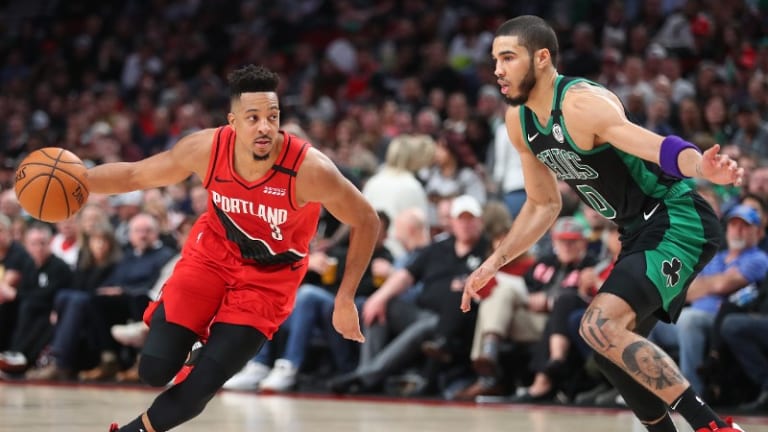
Pregame: Blazers Welcome Jayson Tatum, Surging Celtics To Moda Center
Opponent: Boston Celtics (28-26 overall, 7-3 last 10 games)
Offensive Rating: 113.3 (11th)
Defensive Rating: 111.4 (14th)
Net Rating: +1.9 (ninth)
Where: Moda Center (Portland)
When: 7:00 p.m. (PST)
Broadcast: TNT
Point Spread: Portland -1
Moneyline: Portland -116, Boston -102
Over/Under: 229.5
Injuries/Health
- Portland: Zach Collins (out)
- Boston: Evan Fournier (out)
Primer: The Celtics, unlike the Blazers, might be peaking at just the right time.
A season ravaged by injuries and COVID-19 complications made Boston one of the league's most disappointing teams less than three weeks ago, sitting two games below .500. The Celtics are 7-3 since, with wins over the Milwaukee Bucks and Denver Nuggets. Their only non-competitive loss over that timeframe came to the Philadelphia 76ers; they went down to the wire in defeats to the New Orleans Pelicans and Dallas Mavericks.
The biggest reason for Boston's turnaround is obvious: health. Jayson Tatum and Marcus Smart have played in each of the Celtics' last 10 games. Jaylen Brown has missed one, and Kemba Walker two. That quartet, comprised of the Celtics new starting five, has taken the floor together in just 14 games this season, per NBA.com/stats, largely unavailable due to Walker's injury management and Smart's left calf strain.
The numbers for that group are underwhelming, a symptom of Boston's incessant rotational churn as much as collective and individual struggles – all factors that appear to be dissipating. The Celtics' roster is far better balanced in wake of the trade deadline, with Evan Fournier (out on Tuesday due to health and safety protocols) earmarked as a sixth man and Stevens' frontcourt approach finally being forced into focus.
Tatum's improved play, though, is the real engine behind Boston's success of late. Slowed by complications from coronavirus ever since his January diagnosis, Tatum is now playing like the superstar that took basketball by storm before the league shutdown last season. He's averaging 27.2 points per game on 61.1 percent true shooting since the All-Star break, playing with sustained energy and verve that was previously hard to muster due to breathing issues post-COVID.
Tatum's length, ball-handling ability and shot-making prowess make him a tough matchup for the undersized Blazers. Same goes for Jaylen Brown, whose physicality as a penetrator and mid-range scorer is arguably unmatched across the league.
Robert Covington will likely get the start on Tatum, and Norman Powell on Brown. But expect Portland to regularly switch across four positions on Tuesday night, discouraging the defensive rotations Terry Stotts' team struggles to make cohesively.
On the other hand, playmaking is the Celtics' biggest weakness on offense. Turning Tatum and Brown into passers by deploying more traditional help-and-recover strategies is probably the best means of stringing together stops against Boston. If only Portland could manage that on-a-string defensive philosophy for more than a few fleeting possessions per game.
Bottom Line: The Celtics, like every team with star wings, are a bad matchup for the Blazers. Jump-shooting will decide this game more than anything else, and Boston's superior size and defense means Portland's attempts will be more difficult.